A Week of Bees, Told in Three Chapters
...
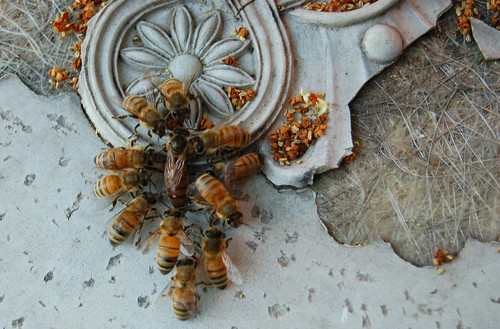
Here's a little glimpse into my life as an urban beekeeper. All this happened over the course of a week.
I had been contacted by Rick (a semi-neighbor, who "knew" me through a gardening discussion forum) who wanted a bit of advice about his back yard hive. I met him at his house, and we opened up his hive. The colony was small, but thriving. The bees had plenty of food stores, and were raising the next generation of bees. Everything looked exactly as it should, and the bees were very relaxed. We spent a fair amount of time, exploring the hive, and were pleased with everything we saw.
Just after we closed up the hive-box, I noticed a cluster of bees on the ground. I figured that Rick and I had dropped a bit of honey, and the bees were lapping it up. The strange thing is that the bees were nowhere near where we had been working. Odd.
I had taken off my bee suit, and stooped to take a closer look.
Well, crap.
There, in the middle of the clump of bees was Rick's queen. This is what no beekeeper ever hopes to see. The queen is not a good flyer, once she's been mated, and I couldn't imagine how she had gotten so far from the hive. We quickly "suited up" again, and picked up the garden hose cover that the bees were on. I had a good look at the queen, and she seemed to be fine. I was terrified that she might have been injured. Rick's colony was small, and the last thing he needed was to lose his queen. The bees could surely raise a new one, but doing so would be a real set-back.
We carried the lid over to the hive, and I intended to tip her back inside. And just as I was saying "...and now, I'm going to coax her into the hive," I lost track of her. She just vanished. Great, some bee-advisor I was turning out to be. I had lost Rick's queen. I fervently hoped that she had scampered into the hive, licketty-split, but because I have a fertile imagination for disaster I was certain that she'd met with a dreadful accident.
As it turned out, Rick checked in on his hive at the end of the week, and all indications were that the queen was alive and well. (I still feel like a jerk.)
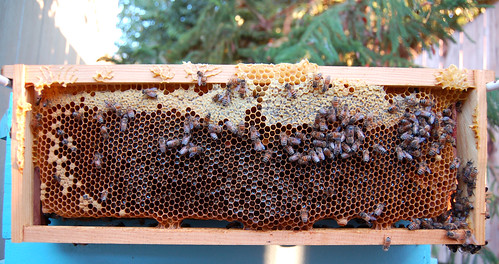
Later that week, I was house- and pet-sitting for Allie, which gave me an opportunity to check on the bees that some jackass had sprayed with insecticide. (Combining pet-sitting and beekeeping makes a lot of sense, as it turns out. Beekeepers' gloves are a great tool when caring for feisty pet parrots.)
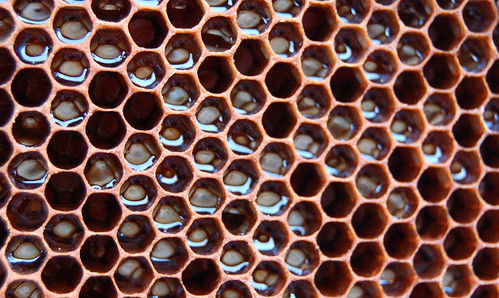
Despite the devastation that we'd seen at the time of the attack, Allie's bees were doing just fine. They had tons of nectar stored up, and baby bees were emerging from their brood cells. Allie lives on the other side of the hills from us. As is typical with California micro-climates, her place is usually ten to twenty degrees hotter than Oakland, where Robb and I live. I've learned that the best time to inspect her hives is at dusk, because otherwise I just overheat. People who tell you to check the bees at high noon either live in a very cool climate, or are just plum crazy. Sweating inside a bee suit, and dealing with bees at the busiest part of their day is not my idea of a good time.
The one problem with evening bee inspections is that it is often just a smidge too dark for photography. I'll spare you my blurry photos of emerging baby bees.
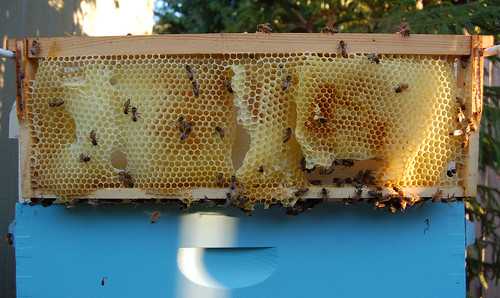
I let the bees build their own comb. I've read that the wax used on commercial "foundation" is harvested from the largest industrial beekeepers, and that it is often contaminated with all manner of agro-chemicals. As a mostly-organic beekeeper, I have no interest in introducing unknown chemicals into my hives. Anyway, the bees have been building their own comb for millions of years.
I had given the bees a bit of wax "starter strip" when I first set up Allie's hive, but it all melted in the heat. I think there weren't enough bees on that particular wax. Bees regulate the temperature inside their hives, heating in the winter, and cooling in the summer. I guess Allies bees weren't able to keep up with hive cooling when they first set up housekeeping.
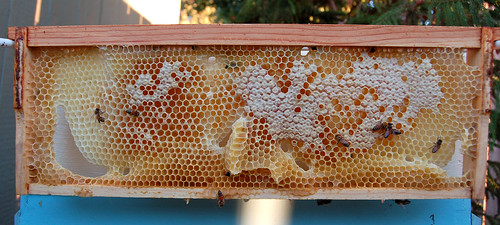
Most of the comb the bees had built was straight and fit nicely into the hive.
But there was a bit of eccentric architecture. This style of hive is a sort of filing cabinet, filled with bees. If the frames are too wonky, they'll get damaged during hive inspections. As long as things are pretty much straight, I'm content.
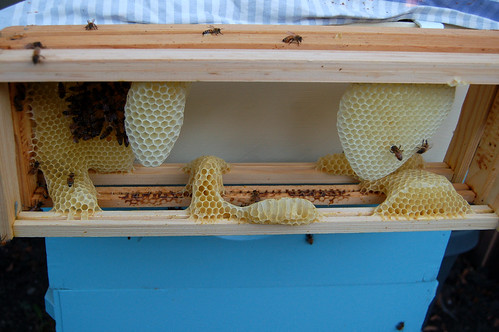
I did remove these particular frames, because the bees had built comb that bridged all three frames. If I had left them in place, the bees would have filled all the comb in, and when we went to inspect, I would have ripped apart either brood comb or honey comb. Damaging brood comb kills developing bees, and ripping up honey comb spills honey, which drowns bees. Either way, it isn't good.
The bees know what they're doing. It's the beekeepers who are tearing things apart, in the course of our inspections.
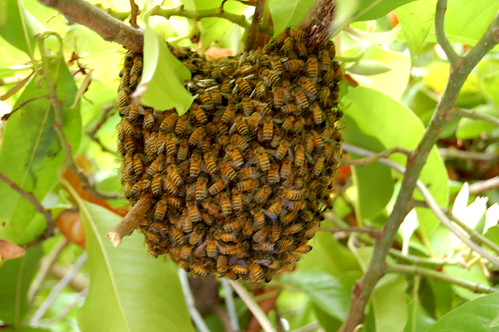
While I was at Allie's I got a frantic call from a gentleman who had a swarm of bees in his front yard. By the time I got home, it was too dark to do anything, so I stopped by his house the next morning.
He was totally freaked out. He also didn't speak English perfectly. His English was way better than my non-existent Chinese could ever be. Still, I had to explain everything in very simplistic terms.
This late-summer swarm was quite small, very calm, and almost at head height. I borrowed a stepladder from the homeowner, and with his permission, cut off the branch on which the bees were resting.
He stood on the sidewalk, across the street from his house as I worked. He wanted nothing to do with these bees. Despite his fears, he did call a beekeeper instead of spraying the bees with poison. Not everyone would have done this.
Without a doubt, this was the easiest swarm I had ever collected. I think I had finally broken my streak of bad luck, and didn't get stung in the ass. (You think I'm kidding? Click here, or here to read about my misadventures.)
Robb and I set these bees up in our back yard, and gave them a frame of capped honey and a frame of brood. Hopefully, they'll be strong enough to make it through the winter. If they survive, I'm going to offer them to one of our neighbors. I'm really interested in "hosting" hives at friends' houses.
If you live nearby and are interested in keeping bees, but don't want to do all the work, let me know. I'll set you up with bees, and take care of them. And if there's any honey to harvest, we can share it.

Here's a little glimpse into my life as an urban beekeeper. All this happened over the course of a week.
I had been contacted by Rick (a semi-neighbor, who "knew" me through a gardening discussion forum) who wanted a bit of advice about his back yard hive. I met him at his house, and we opened up his hive. The colony was small, but thriving. The bees had plenty of food stores, and were raising the next generation of bees. Everything looked exactly as it should, and the bees were very relaxed. We spent a fair amount of time, exploring the hive, and were pleased with everything we saw.
Just after we closed up the hive-box, I noticed a cluster of bees on the ground. I figured that Rick and I had dropped a bit of honey, and the bees were lapping it up. The strange thing is that the bees were nowhere near where we had been working. Odd.
I had taken off my bee suit, and stooped to take a closer look.
Well, crap.
There, in the middle of the clump of bees was Rick's queen. This is what no beekeeper ever hopes to see. The queen is not a good flyer, once she's been mated, and I couldn't imagine how she had gotten so far from the hive. We quickly "suited up" again, and picked up the garden hose cover that the bees were on. I had a good look at the queen, and she seemed to be fine. I was terrified that she might have been injured. Rick's colony was small, and the last thing he needed was to lose his queen. The bees could surely raise a new one, but doing so would be a real set-back.
We carried the lid over to the hive, and I intended to tip her back inside. And just as I was saying "...and now, I'm going to coax her into the hive," I lost track of her. She just vanished. Great, some bee-advisor I was turning out to be. I had lost Rick's queen. I fervently hoped that she had scampered into the hive, licketty-split, but because I have a fertile imagination for disaster I was certain that she'd met with a dreadful accident.
As it turned out, Rick checked in on his hive at the end of the week, and all indications were that the queen was alive and well. (I still feel like a jerk.)

Later that week, I was house- and pet-sitting for Allie, which gave me an opportunity to check on the bees that some jackass had sprayed with insecticide. (Combining pet-sitting and beekeeping makes a lot of sense, as it turns out. Beekeepers' gloves are a great tool when caring for feisty pet parrots.)

Despite the devastation that we'd seen at the time of the attack, Allie's bees were doing just fine. They had tons of nectar stored up, and baby bees were emerging from their brood cells. Allie lives on the other side of the hills from us. As is typical with California micro-climates, her place is usually ten to twenty degrees hotter than Oakland, where Robb and I live. I've learned that the best time to inspect her hives is at dusk, because otherwise I just overheat. People who tell you to check the bees at high noon either live in a very cool climate, or are just plum crazy. Sweating inside a bee suit, and dealing with bees at the busiest part of their day is not my idea of a good time.
The one problem with evening bee inspections is that it is often just a smidge too dark for photography. I'll spare you my blurry photos of emerging baby bees.

I let the bees build their own comb. I've read that the wax used on commercial "foundation" is harvested from the largest industrial beekeepers, and that it is often contaminated with all manner of agro-chemicals. As a mostly-organic beekeeper, I have no interest in introducing unknown chemicals into my hives. Anyway, the bees have been building their own comb for millions of years.
I had given the bees a bit of wax "starter strip" when I first set up Allie's hive, but it all melted in the heat. I think there weren't enough bees on that particular wax. Bees regulate the temperature inside their hives, heating in the winter, and cooling in the summer. I guess Allies bees weren't able to keep up with hive cooling when they first set up housekeeping.

Most of the comb the bees had built was straight and fit nicely into the hive.
But there was a bit of eccentric architecture. This style of hive is a sort of filing cabinet, filled with bees. If the frames are too wonky, they'll get damaged during hive inspections. As long as things are pretty much straight, I'm content.

I did remove these particular frames, because the bees had built comb that bridged all three frames. If I had left them in place, the bees would have filled all the comb in, and when we went to inspect, I would have ripped apart either brood comb or honey comb. Damaging brood comb kills developing bees, and ripping up honey comb spills honey, which drowns bees. Either way, it isn't good.
The bees know what they're doing. It's the beekeepers who are tearing things apart, in the course of our inspections.

While I was at Allie's I got a frantic call from a gentleman who had a swarm of bees in his front yard. By the time I got home, it was too dark to do anything, so I stopped by his house the next morning.
He was totally freaked out. He also didn't speak English perfectly. His English was way better than my non-existent Chinese could ever be. Still, I had to explain everything in very simplistic terms.
This late-summer swarm was quite small, very calm, and almost at head height. I borrowed a stepladder from the homeowner, and with his permission, cut off the branch on which the bees were resting.
He stood on the sidewalk, across the street from his house as I worked. He wanted nothing to do with these bees. Despite his fears, he did call a beekeeper instead of spraying the bees with poison. Not everyone would have done this.
Without a doubt, this was the easiest swarm I had ever collected. I think I had finally broken my streak of bad luck, and didn't get stung in the ass. (You think I'm kidding? Click here, or here to read about my misadventures.)
Robb and I set these bees up in our back yard, and gave them a frame of capped honey and a frame of brood. Hopefully, they'll be strong enough to make it through the winter. If they survive, I'm going to offer them to one of our neighbors. I'm really interested in "hosting" hives at friends' houses.
If you live nearby and are interested in keeping bees, but don't want to do all the work, let me know. I'll set you up with bees, and take care of them. And if there's any honey to harvest, we can share it.

Comments
By the way, do you want some mpre baby alpaca wool?
Annalisa
We did start out with foundation, but will gradually checkerboard in empty frames next spring. The bees did very well with that this year, and it's my goal to rotate out the frames with foundation gradually. I might keep a few for swarm captures but that's about it.
I agree about sweating in a bee suit, we've done it a few times, and it's miserable!
Glad Allie's bees are doing so great, she deserves to have that hive thrive, even if it's just to spite the moron that sprayed them!
So a guy takes his pet parrot to the vet. He says to the vet, Doctor, my parrot is sick, what can you do for it? The vet looks the parrot all over, and shakes his head no. He turns to the owner and says "Your parrot is going to die. I cant do anything about it. That will be $50."
The owner of the parrot says to the vet "What! You must be crazy! All you did was look at it for 2 seconds and tell me its gonna die and charge me $50?!?!? I cant freaking believe it! I want a second opinion! So the doctor says, "ok". He opens the door to the room, and a labrador retriever walks in, sniffs the parrot, shales his head and walks out. Then a cat comes in and walks around the parrot, sniffs it, then shakes its head and walks out. The doctor says to the guy, "there you have it. Everyone says the parrot is gonna die, that will be $150, please"
The parrot owner is beside himself with anger. "What do you mean everyone says the parrot will die! And what was with the dog and the cat? And why are you charging me $150 now instead of the $50 you first said? "
The doctor looks at the guy and says- "Well, we did the lab work and the cat scan, and that is why your bill is now $150."
Sincerely, Annalisa!
Sad,
Jenn
I wonder if my local beekeeper would be interested in fostering some of his bees out? I've got a meadow which is full of wildflowers, so I must ask!